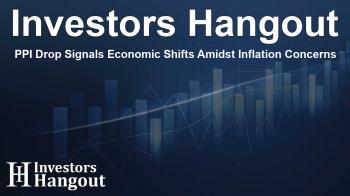PPI Drop Signals Economic Shifts Amidst Inflation Concerns

Understanding the Latest Producer Price Index Trends
The Producer Price Index (PPI) serves as a vital gauge for consumer price inflation, and its latest readings have shown a dip that was less favorable than predicted. Recently released data indicates that the PPI increased by only 0.2%, a substantial divergence from the anticipated 0.4% increase.
Implications of Lower PPI Readings
This unexpected reduction may signify a deceleration in inflationary trends. Economists and market watchers place considerable importance on the PPI data as it offers early hints of inflationary movements, which are instrumental for the Federal Reserve in shaping monetary policies.
Last Month's Performance Compared
In contrast to the current month, the previous PPI reading remained stable at 0.4%, mirroring the forecasted number. The recent decrease in PPI could raise concerns regarding the strength of the US dollar since it might suggest a cooling economy.
The Role of PPI in Economic Analysis
As a critical indicator, the PPI captures a large portion of overall inflation. A stronger-than-expected PPI is generally perceived as a positive signal for the USD, indicating that manufacturers are successfully transferring rising costs onto consumers, reflecting a resilient economy.
Navigating Manufacturer Challenges
On the flip side, a lower PPI reading like the current one could be interpreted negatively. It points to manufacturers' inability to shift higher costs to consumers, which might stem from low demand or intense market competition. This situation can create potential challenges within the manufacturing sector.
Future Federal Reserve Considerations
This recent decline in PPI is likely to be a focal point for the Federal Reserve during its forthcoming discussions. Continued patterns of lower PPI might pressure the central bank to adopt a more lenient approach, potentially leading to reductions in interest rates.
Conclusion: Potential Economic Shifts Ahead
In summary, the recent PPI figures hint at a possible slowdown in consumer price inflation, which could have notable repercussions for the US economy and influence the Federal Reserve's future monetary strategies. Market participants will be keeping a close eye on these developments as they unfold.
Frequently Asked Questions
What does a lower PPI reading mean for consumers?
A lower PPI reading may suggest that inflation is slowing down, which could indicate that prices for goods may not rise as quickly, potentially benefiting consumers.
How does the PPI affect the stock market?
The PPI can influence market perceptions of inflation and economic strength, which in turn may affect stock prices and investor sentiment.
Why is the PPI important for the Federal Reserve?
The Federal Reserve uses PPI data to gauge inflation trends, which is crucial for determining interest rates and monetary policy direction.
What might happen if PPI continues to decrease?
If the PPI continues to decrease, it could lead the Federal Reserve to consider lowering interest rates to stimulate the economy and counteract inflationary pressures.
Is the PPI the only indicator of inflation?
No, the PPI is one of several indicators used to assess inflation. Other important measures include the Consumer Price Index (CPI) and the Personal Consumption Expenditures Price Index (PCE).
About The Author
Contact Hannah Lewis privately here. Or send an email with ATTN: Hannah Lewis as the subject to contact@investorshangout.com.
About Investors Hangout
Investors Hangout is a leading online stock forum for financial discussion and learning, offering a wide range of free tools and resources. It draws in traders of all levels, who exchange market knowledge, investigate trading tactics, and keep an eye on industry developments in real time. Featuring financial articles, stock message boards, quotes, charts, company profiles, and live news updates. Through cooperative learning and a wealth of informational resources, it helps users from novices creating their first portfolios to experts honing their techniques. Join Investors Hangout today: https://investorshangout.com/
The content of this article is based on factual, publicly available information and does not represent legal, financial, or investment advice. Investors Hangout does not offer financial advice, and the author is not a licensed financial advisor. Consult a qualified advisor before making any financial or investment decisions based on this article. This article should not be considered advice to purchase, sell, or hold any securities or other investments. If any of the material provided here is inaccurate, please contact us for corrections.

